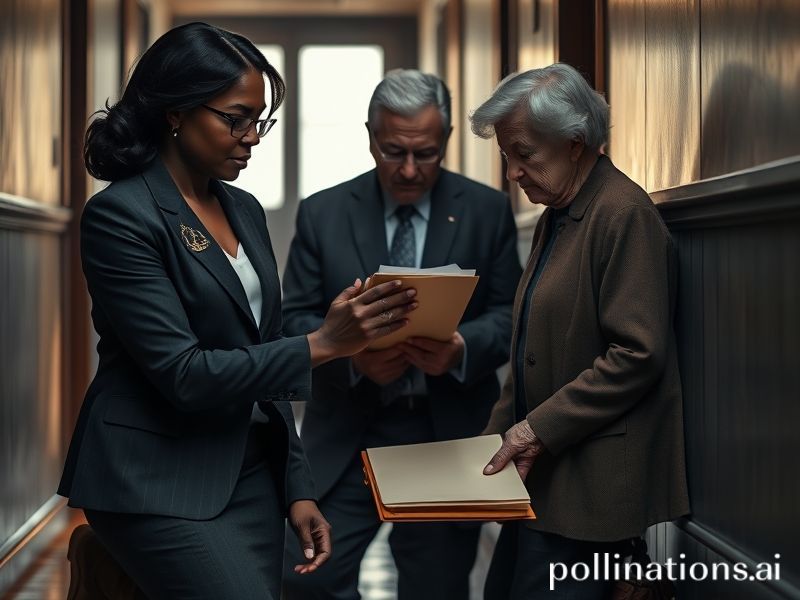Globetrotting Grief: How Wrongful Death Attorneys Became the World’s Newest Export
Wrongful Death Attorney: The Global Reaper’s Little Helper
by Dave’s Locker International Desk
PARIS—In most countries you need a license to drive, to fish, and—if you ask nicely—to sell baguettes. Only in the realm of death does no permit seem required: crosswalks in Lagos, mining pits in China, hospital corridors in São Paulo, and American school hallways all issue the same open invitation. Enter the wrongful death attorney, the world’s newest import-export commodity, now franchised from Tokyo to Tijuana as efficiently as Starbucks.
The job description is almost poetic: translate heartbreak into a spreadsheet, then persuade strangers that the spreadsheet is worth a wire transfer. The attorney is grief’s hedge fund manager, arbitraging sorrow against actuarial tables. France calls them avocats en responsabilité civile; Germany, Anwälte für Schadenersatz; Japan cleverly files them under “special damages counsel,” a phrase so bland it could be a sushi roll. Whatever the language, the game is the same—turn mortality into liquidity.
Consider the supply chain. A defective Dutch e-bike battery cooks a Berlin apartment; three continents later, a Los Angeles firm is suing a Shenzhen manufacturer, a Rotterdam distributor, and a teenager who may or may not have read the manual. Welcome to globalization’s afterparty: death without borders, litigation without frontiers. The European Union is debating a uniform wrongful-death directive; meanwhile, British barristers are brushing up on U.S. state codes for post-Brexit class actions. Somewhere in Davos, a consultant is billing hourly to quantify “existential brand risk” if too many people stop existing.
In the Global South, wrongful death law is still artisanal. Kenyan widows pool bus fare to reach Nairobi’s lone specialist; in rural India, the nearest courthouse is three train changes and one bribe away. Yet venture capital smells opportunity. A Singapore start-up now sells “litigation financing” via smartphone app, letting bereaved families sell a slice of future awards for groceries today. The interest rate—compounded weekly, because why not—would make a mafia loan shark blush. Call it microfinance for macro-loss.
Not everyone applauds. Italian prosecutors grumble that wrongful-death settlements are becoming the new mafia pension fund; Russian oligarchs allegedly stash bodies and NDAs in the same offshore vault. At the Hague, diplomats argue over whether drone strike victims qualify for the same damages as cruise-ship food-poisoning fatalities. Consensus is elusive, mostly because the loudest delegate is billing by the minute.
The United States, naturally, remains the undisputed champion of turning tears into cash. American juries routinely award sums that could bankroll a small Balkan republic. Foreign firms now hire U.S. counsel just to learn how to say “pain and suffering” in the key of punitive damages. The cultural export is so potent that a Seoul billboard promises “American-style verdicts—no visa required.” One imagines Lady Justice swapping her scales for a Silicon Valley valuation chart.
Still, there are tender mercies. In Australia, a landmark case forced a coal conglomerate to fund lifelong lung scans for miners’ families—proof that sometimes the spreadsheet grows a conscience. In Argentina, mothers of train-crash victims used settlement money to plaster Buenos Aires with safety posters, ensuring their children’s deaths at least slowed the next train. Even cynics must concede: when the system works, grief gets a seat at the boardroom table.
But mostly the system just works the system. Somewhere tonight, a fresh law graduate in Lagos is cold-calling morgues, while a chatbot in Zurich calculates the net-present value of a broken heart. Across time zones, the same quiet transaction repeats: love becomes loss, loss becomes claim, claim becomes line item. And the wrongful death attorney—part priest, part repo man—files the paperwork, pockets the contingency, and schedules the next intake call. Because as long as humans keep inventing faster scooters, looser regulations, and cheaper concrete, the world will need someone fluent in both condolence and comma splice.
In the end, the joke is on us. We built skyscrapers, vaccines, and dating apps, yet never mastered the art of staying alive. Until we do, there’s a 24-hour helpline. Operators—plus translators—are standing by.







